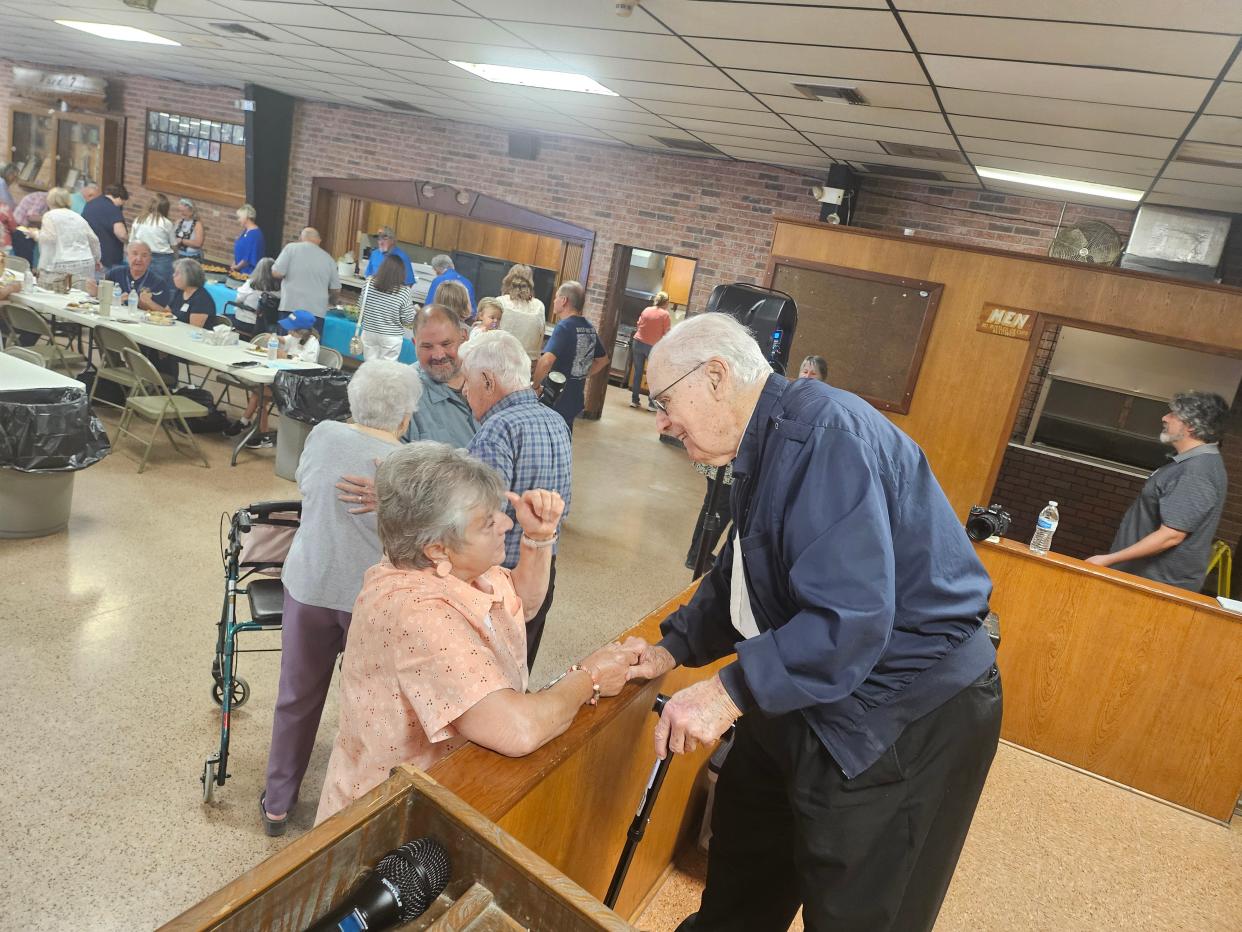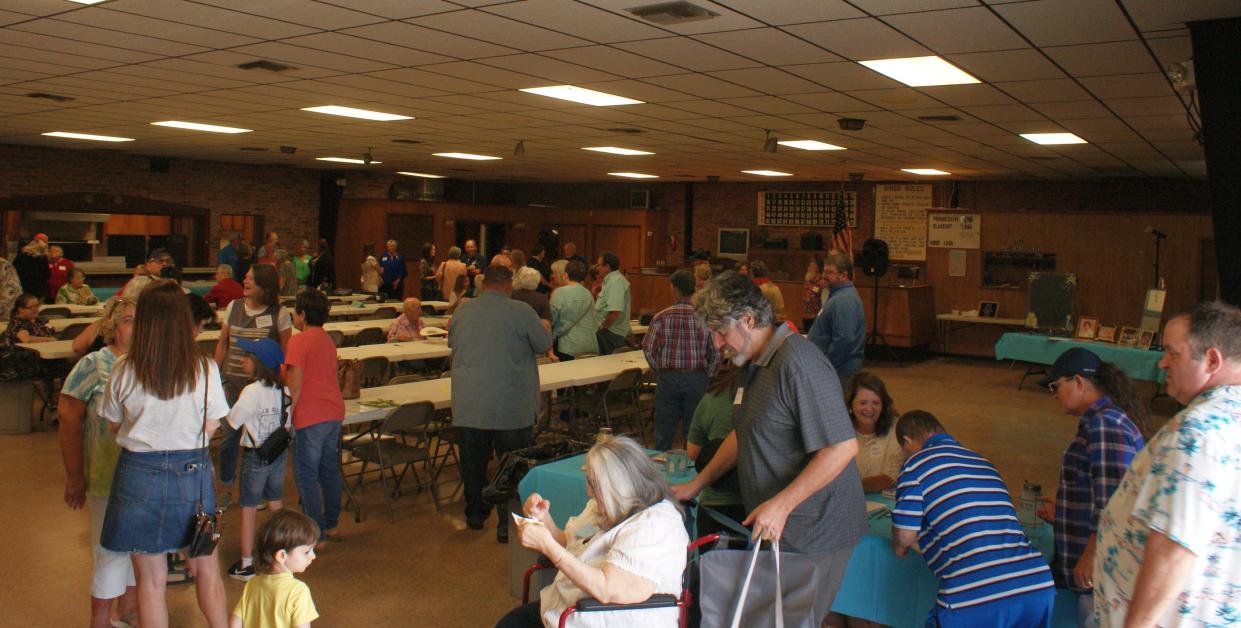Chauvin community gathers to celebrate its past, faces uncertain future
A storm beaten community, bleeding population and infrastructure, gathered in its last community center to celebrate the past.
"Good mornin' captain! Good morning to you, ha-ha-ha, ha-ha-ha," 90-year-old the Rev. Frederic J. Brunet sang.
Brunet was the priest of St. Joseph Catholic Church in Chauvin for 42 years and founded the Lagniappe on the Bayou. He was one of three speakers who addressed more than 50 people gathered April 27 in the Ward 7 Citizens Club. The group took photos and swapped stories of the past accomplishments of their community.
The attendees were holding school reunions for four now-closed-schools. The crowd was composed of teachers and students, and they gathered to take photos together as mementos. They had lunch together, and as they ate, two educators and Brunet gave speeches about proud moments of the past.
The event was about finding closure, organizer Jonathon Foret said, and hopefully raising morale.

"Nobody talked about it, they were just closed. We weren't able to talk about it as a community," Foret said. "There's few reasons we get together anymore. People used to get together for Lagniappe and a cause in Chauvin, and we don't have that anymore."
Lagniappe on the Bayou was a festival in Chauvin that raised money to pull the St. Joseph Catholic Church out of debt. It succeeded beyond anyone's expectations, Brunet said, all because of the drive of the Chauvin community.
One story Brunet recalled told how, within two hours of organizing, locals were boiling crabs with the remnants of a hot water heater as a fundraiser. Another instance had the Terrebonne Sheriff calling in a sea plane to ferry in food for the festival.
The people of Chauvin would overcome any obstacle to help one another, Brunet said, because everyone in Chauvin is considered family.
"This whole community is like one family," he said. "They cared for one another, looked out for one another, and if anybody needed help, they were going to get it from the community. I could break down anywhere on the road from Houma to Cocodrie, and there would be somebody to come out there, give me some coffee, bring me a sandwich, help me fix the car, help me get home."
Chauvin, a south Terrebonne community, has suffered a gradual but extensive loss of what experts call anchors that bind a community to a location. Chauvin has had four schools close, its swimming pool has closed, the library has moved northward, and it has one remaining bank.
The community was one of the worst hit by Hurricane Ida, which was the final blow for many of those anchors. The exodus of businesses and people was further compounded when the Federal Emergency Management Agency reevaluated its risk assessment for the National Flood Insurance Program, which is making the price for flood insurance unfeasible for many.
But according to the data, the people already were leaving, the storm and the insurance just accelerated the trend.
The schools reveal the trend as each was closed when there weren't enough students attending to justify them remaining open: Little Caillou Elementary, 1956-2007; Boudreaux Canal Elementary, 1938-2013; Upper Little Caillou Elementary School, opened in 1971, relocated in 2021 because of Ida, demolished in 2024 currently to rebuild in Chauvin; and Lacache Middle School, built in early 1900s, burned in 1909, rebuilt in 1910, destroyed in 1923 hurricane, rebuilt but destroyed twice between 1924 and 1947. The current building was constructed in 1948 and closed in 2023. Lacache is merging with Montegut Middle and built near South Terrebonne.
Residents, however, ask who would want to move to the area when there isn't anything left to draw them to the community. Not only that, demolishing sites that contain so much history removes any ties to the area remaining residents might have. Every government entity is stacking the odds against them, they say, as if officials want them to fail.

"It feels almost like they don't want down here to exist anymore," Melisa Naquin, 56, said. "When I passed and they were tearing down the Upper Little Caillou School, my heart sank. I just felt so hurt because there were so many memories as a young person that I made and friends I had, and to see it gone is like a part of my childhood is taken away."
Naquin grew up in Chauvin, attended Upper Little Caillou, and later moved away for a number of years. She moved back to the neighboring Montegut, where she lives now with her daughter.
She said the loss of all of this infrastructure has left her 17-year-old daughter, Bridgette Naquin, with little to do. Naquin said she is in marching band, but other than that, she goes home after school to play Minecraft with her friends.
"I think it's bad for the area because of the fact that there's nothing for the kids down here to go do," the mother Naquin said. "I just feel that they need to put something back in here. There's absolutely nothing."
Bridgette was asked if she would like something to do in the area for entertainment. She said she didn't know anything in particular, but something that provided a space where she and her friends could congregate to hang out would be nice.
Tina Levron, 68, stood behind a table wearing an apron and was setting up food for the community's meal. She grew up in the area and attended Little Caillou Elementary from 1961 through 1968. She is one of eight siblings to grow up in the area - three of whom still live in Chauvin.
Levron was a lifeguard at the local swimming pool, later worked as a peeler at one of the shrimp factories, and at a pharmacy.
She rode a bus from Chauvin to Nicholls State University with about nine other students to obtain her degree in computer technology. Once graduated, at 19 years old, there just wasn't any opportunity to pursue a career in her chosen field, so she moved to Houma.
She said she loves the community, but it didn't offer what she was looking for, so she eventually moved away.
"Actually, that, 'I got to get out of here,' I never had that," she said. "It was just, you went to school, you got educated, you got a job. I got married, my husband was living in Houma. I moved there."
This article originally appeared on The Courier: Chauvin community celebrates its past, faces uncertain future
